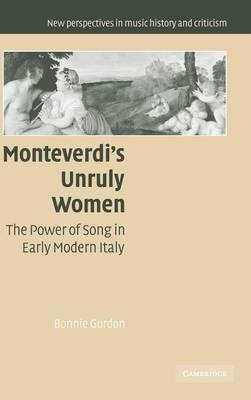
Monteverdi's Unruly Women
The Power of Song in Early Modern Italy
Seiten
2005
Cambridge University Press (Verlag)
978-0-521-84529-8 (ISBN)
Cambridge University Press (Verlag)
978-0-521-84529-8 (ISBN)
Bonnie Gordon uses the music of Monteverdi, written at the turn of the seventeenth century, to illuminate understandings of music, science and the female body at that cultural moment. Her findings are based on singing treatises, renaissance medical writings and seventeenth-century acoustics.
Monteverdi's Unruly Women examines the composer's madrigals and music dramas for what they can tell us about the musical and cultural world of singing and the voice in early modern Italy. Monteverdi's music demanded trained, female voices to make dramatic and expressive statements. At a time when singing was not entirely acceptable for respectable women his music allowed women to use their voices to gain power. Bonnie Gordon also explores the social and musical environment in which the singers lived and worked. Using key primary source material such as singing treatises and Renaissance writings on medicine and acoustics, Gordon contributes to two distinct disciplines: she brings an increased engagement with medical and literary representations of the female body to the growing field of scholarship treating gender and music, and adds to a well-established industry of scholarship devoted to the perception of gender and the body in early modern Europe.
Monteverdi's Unruly Women examines the composer's madrigals and music dramas for what they can tell us about the musical and cultural world of singing and the voice in early modern Italy. Monteverdi's music demanded trained, female voices to make dramatic and expressive statements. At a time when singing was not entirely acceptable for respectable women his music allowed women to use their voices to gain power. Bonnie Gordon also explores the social and musical environment in which the singers lived and worked. Using key primary source material such as singing treatises and Renaissance writings on medicine and acoustics, Gordon contributes to two distinct disciplines: she brings an increased engagement with medical and literary representations of the female body to the growing field of scholarship treating gender and music, and adds to a well-established industry of scholarship devoted to the perception of gender and the body in early modern Europe.
Bonnie Gordon is Assistant Professor of Music at the State University of New York at Stony Brook. She has published on Renaissance music and culture as well as contemporary female song writers.
Introduction; 1. Vocal anatomies: mouths, breath and throats in early modern Italy; 2. Back talk: the power of female song on the stage; 3. Madrigalian desire: the convergence of love and sex in madrigals; 4. Emblazoning Angioletta: musical fantasies and dissection; 5. Angry ladies: changing experiences of sensations; Coda.
| Erscheint lt. Verlag | 6.1.2005 |
|---|---|
| Reihe/Serie | New Perspectives in Music History and Criticism ; Vol.14 |
| Verlagsort | Cambridge |
| Sprache | englisch |
| Maße | 152 x 229 mm |
| Gewicht | 530 g |
| Themenwelt | Kunst / Musik / Theater ► Musik ► Klassik / Oper / Musical |
| Kunst / Musik / Theater ► Musik ► Musikgeschichte | |
| ISBN-10 | 0-521-84529-7 / 0521845297 |
| ISBN-13 | 978-0-521-84529-8 / 9780521845298 |
| Zustand | Neuware |
| Haben Sie eine Frage zum Produkt? |
Mehr entdecken
aus dem Bereich
aus dem Bereich


